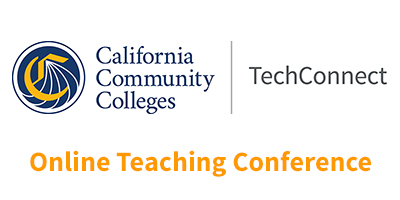Archives (as available) of recorded sessions from OTC’19 can be viewed below. If you’d like embed codes, they are available from TechConnect Cloud (3C Media Solutions).
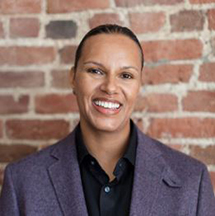
Heather Hiles
CEO and President
California Online Community College District
|
A New Community College: A Fireside Chat with Heather Hiles California is building a new kind of community college – one focused on connecting workers stranded in a shrinking gig economy to 21st century careers. Join President and CEO of this new effort Heather Hiles as she discusses the challenges and opportunities ahead. |
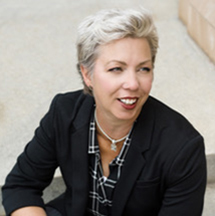 Flower Darby Instructional Designer, adjunct faculty and co-author of Small Teaching Online Northern Arizona University Flower Darby Instructional Designer, adjunct faculty and co-author of Small Teaching Online Northern Arizona University |
Answering the Call: New Motivation for Online Teaching Excellence Online classes are the only option for many, if not most, of our online students. The flexibility of taking classes online allows students to pursue a college degree or credential to improve their lot in life. Yet online classes offer unique teaching and learning challenges that make it easy for students and faculty both to lose faith, grow fatigued, give up. To reinvigorate our online teaching, we’ll consider the call to improve the undergraduate educational experience, identified as National Priority One in a 2017 report from the American Academy of Arts and Sciences. Report authors remind us that education is at the heart of the American dream: “every person, from every background, can succeed in America when given the proper training and preparation” (The Future of Undergraduate Education, The Future of America, 2017). Let’s explore ways of answering this call by re-invigorating our online teaching, motivated by the highest ideal of educating our citizenry toward a brighter future for all. |
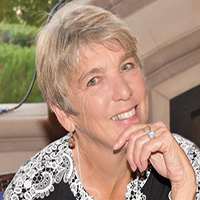
Patricia James
Manager, Educational Outreach, American Public University System
Co-Facilitator:
|
Online Student Community: What Do Students Need from Us? Why does building student community in online classes matter? As online instructors, are we doing all we can to engage our students and in turn increase their likelihood of success? The effective practice of encouraging community in our online classes has been with us a long time. However, the imminent addition of a requirement for student-to-student interaction to our DE regulations should cause us to reimagine how we make it a priority. It’s time to hear first-hand from students! What community development approaches improve the student’s learning experience and foster retention, development and success? Join Kevin and Pat as they facilitate a panel discussion among students about what community building in our online classes means to them. This panel will be made up of a representative sample of online students from the California Community Colleges system and the audience will be able to ask questions as part of the presentation. Please join us in what promises to be an enlightening general session discussion. |
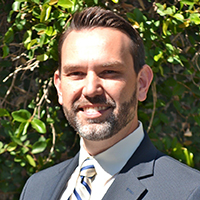
Dr. Jory Hadsell
Executive Director
CVC-OEI/@ONE, Foothill-De Anza CCD
|
California Virtual Campus-OEI: Futures Town Hall What is on the CVC-OEI roadmap for the coming year? This session features the Executive Director, Dr. Jory Hadsell, who will provide a brief update and share insights. Faculty, distance education coordinators, and administrators are encouraged to attend and bring questions for a town hall style conversation. This past year, the Online Education Initiative (OEI), California Virtual Campus (CVC), and Online Network of Educators (@ONE) consolidated into a single statewide initiative, the California Virtual Campus – Online Education Initiative, bringing students access to course section availability data across 56 colleges, over 60 online Associate Degrees for Transfer (ADTs), and streamlined enrollment automation between colleges allowing students to combine financial aid and coursework toward their degree path. The CVC-OEI also includes leading professional development opportunities for faculty, opportunities for peer online course review by fellow faculty, and “untethered” events building a community of online educators in the California Community Colleges. Students benefit from access to Canvas across all CCCs, with embedded resources such as online counseling, online tutoring, readiness for online learning, name and gender identification tools that enhance online equity, and tools that support community building. Currently 56 CCCs are members of the CVC-OEI Consortium. What’s next for CVC-OEI? |
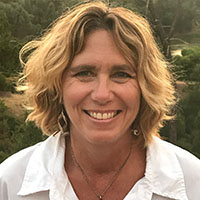 Beth-Ann Dumas Communication Studies Instructor Cuesta College Beth-Ann Dumas Communication Studies Instructor Cuesta College |
Creating Community Through Student-to-Student Zoom Interacts We all crave connection. Learn how to build a strong course community through student to student connection assignments I call Interacts. Students engage with each other synchronously face-to-face at their tablets, computers, or phones via their free Zoom account The Interacts bring an online course to life by providing students the opportunity to engage with the material and each other in a unique way that’s different from most online courses. Anonymous student feedback: The interacts help create a connection with other students that are difficult to attain through most online classes/ I really felt a sense of community, online classes normally aren’t this interactive so it definitely made it fun to meet people and connect over technology/ Other online courses I’ve taken were absolutely nothing like this one, and I wish more online courses had face to face interactions with classmates. I feel closer to my classmates by actually speaking to them rather than using the discussion boards./ I feel a very close sense of community in this class, so much so that I don’t want the semester to end. I made friends in this class due to the interacts. Session Presentation/Resources: https://bit.ly/2WgvTpk |
 Michael Smedshammer Distance Education Coordinator Modesto Junior College Co-presenters: Michael Smedshammer Distance Education Coordinator Modesto Junior College Co-presenters:
|
Equity Through Community: How Humanized Instruction Leads to Equity Online Research shows that a caring, engaged instructor is key to supporting underserved students who learn online (Jaggars & Xu, 2016). But faculty who teach online don’t always consider how important their presence is to their students. The majority of California’s 2.1 million community college students are ethnic minorities (67%). Forty percent of students enrolled in California Community Colleges (CCCs) are first generation college students, nearly half experience food insecurity, and roughly one in three experience the threat of homelessness. Online classes are critical to the mission of community colleges. Today, more than 24% of CCC enrollments are generated through online courses. Through the OEI and the @ONE Project, the California Community College system offers a robust suite of free and low-cost professional development options to prepare faculty to teach online, including online courses. The online courses place faculty in the role of an online learner with a cohort of peers. One of these courses, Humanizing Online Teaching and Learning, inspires faculty to become present, aware, and empathetic online instructors and dabble in tools that enable them to cultivate their presence in their own course. Within the course, they experience the social and emotional impact of human presence, and apply research-based practices to their own course. Session Presentation/Resources: sites.google.com/view/otc19 |
 Bob Nash Dean of Academic Affairs California Virtual Campus-Online Education Initiative (CVC-OEI) Panel/Co-presenters: Bob Nash Dean of Academic Affairs California Virtual Campus-Online Education Initiative (CVC-OEI) Panel/Co-presenters:
|
Online Course Development & Delivery: Oral Communications The lack of online public speaking courses has become a serious bottleneck for students who need or want to earn their degrees entirely online. During this panel discussion, attendees will learn how their faculty colleagues at other California colleges have designed, developed, and delivered oral communication courses fully online. Best practices will be offered and challenges will be noted, along with potential solutions (e.g., how students will present in an online format and how faculty/students can assess those presentations). I will moderate the discussion with three faculty panelists who are or recently have taught online oral communications courses, with special emphasis on public speaking. Presentation file/s: Session Presentation/Resources: NASH – Online Course Development Oral |
 Bob Nash Dean of Academic Affairs California Virtual Campus-Online Education Initiative (CVC-OEI) Panel/Co-presenters: Bob Nash Dean of Academic Affairs California Virtual Campus-Online Education Initiative (CVC-OEI) Panel/Co-presenters:
|
Online Course Development & Delivery: Math The lack of online math courses has become a serious bottleneck for students who need or want to earn their degrees entirely online. During this panel discussion, attendees will hear how their faculty colleagues at other California colleges have designed, developed, and delivered math courses fully online (or partially online with proctoring). Best practices will be offered and challenges will be noted, along with potential solutions (e.g., use of OER materials and alternatives for remote F2F proctoring of exams). I will moderate the discussion with three faculty panelists who teach online transferable math courses. Presentation file/s: Session Presentation/Resources: NASH – Online Course Development Math |
 Bob Nash Dean of Academic Affairs California Virtual Campus-Online Education Initiative (CVC-OEI) Panel/Co-presenters: Bob Nash Dean of Academic Affairs California Virtual Campus-Online Education Initiative (CVC-OEI) Panel/Co-presenters:
|
Online Course Development & Delivery: Science Labs The lack of online science lab courses has become a serious bottleneck for students who need or want to earn their degrees entirely online. During this panel discussion, attendees will hear how their faculty colleagues at other California colleges have designed, developed, and delivered science lab courses fully online. Best practices will be offered and challenges will be noted, along with potential solutions (e.g., how students can experience rich lab experiences virtually or using various lab kit options available). OER materials will also be explored. I will moderate the discussion with three faculty panelists who are or recently have taught online science lab courses that meet CSU and UC general education requirements. Presentation file/s: Session Presentation/Resources: NASH – Online Course Development Science |
 Jim Marteney Professor Emeritus Los Angeles Valley College Jim Marteney Professor Emeritus Los Angeles Valley College |
Using Canvas Rubrics to Make Your Life Easier In this highly interactive session we will examine how we can use the Canvas Rubric tool to make our teaching easier and more effective. After exploring the advantages of using rubrics for our class tasks, we will examine the nuts and bolts of using Canvas rubrics. Participants will be leaving this session not only with a working knowledge of Canvas Rubrics, but also with specific rubrics they have created and can immediately apply to the assignments in their classes. If you want to make your assignment expectations clear and your grading easier, this session is for you. Session Presentation/Resources: MARTENEY – Using Canvas Rubrics |

Liz du Plessis
Faculty and Instructional Designer
CVC-OEI
Co-presenters:
|
Collaborative Annotation: Connecting with Texts Using a Reading Apprenticeship Framework Digital annotation tools offer news ways to foster collaboration and digital literacy skills. In this session, a panel of CCC faculty share their experiences piloting the free Hypothesis LTI app in Canvas using a Reading Apprenticeship framework. Hypothesis is an open-source, collaborative annotation software that enables students to highlight text on any web page or PDF, insert annotations, and reply to others. Annotations can include text, images, and video for multimedia storytelling and analysis. Hypothesis provides an engaging alternative to discussion forums for activities centered on a text. The faculty panel will provide examples of how to combine collaborative annotation with Reading Apprenticeship (RA) strategies to guide students in discipline-specific ways of engaging with texts, from historical interpretation to rhetorical analysis. Session Presentation/Resources: DU PLESSIS – Collaborative Annotation |
 Amy Beadle Statewide Program Manager/Project Lead, California Community Colleges Technology Center Co-presenter: Amy Beadle Statewide Program Manager/Project Lead, California Community Colleges Technology Center Co-presenter:
|
Library Services Platform Project – Equity for All The library services platform project is off and running with 110 colleges making the change to the systemwide platform. The move to the Ex Libris Alma/Primo platform will bring increased collaboration, enhanced resources and provide an equitable experience for all CCC students. Come and learn about the implementation experience thus far and look ahead to see the enhanced value this product will bring to the system. Session Presentation/Resources: BEADLE-CARBONARO_Library Services Platform-Equity for All |
 Bonnie Peters Chief Student Services Officer/Director of Student Experience, Foothill-DeAnza Community College Co-presenter: Bonnie Peters Chief Student Services Officer/Director of Student Experience, Foothill-DeAnza Community College Co-presenter:
|
Shaping Student Success with Innovative Online Student Support Services In this session the CVC-OEI Student Experience division will introduce ongoing efforts to create a holistic online learning environment. Learn more about innovative tools that can help cultivate connections by increasing student engagement, student sense of belonging, student wellness and ultimately student success. This session will explore the opportunities to bridge Online Instruction and Student Services. Discover how the CVC-OEI is currently supporting the California Community Colleges, by providing online professional development opportunities for staff, and increasing overall access to online student support services for both online students and traditional students. Demonstrations in Canvas: Online Professional Development for General Counselors and Mental Health Clinicians. Introduction and access to Wellness Central- student facing interactive health and wellness modules. Session Presentation/Resources: Peters – Shaping Student Success |
 James Glapa-Grossklag Dean, Learning Resources College of the Canyons Co-presenters: James Glapa-Grossklag Dean, Learning Resources College of the Canyons Co-presenters:
|
Statewide Accessibility Resources and Services to Make Online Classes Accessible A consistent hot topic for online instruction is accessibility (Section 508 compliance)–offering classes from which all of our students can benefit. At this session, leaders of major statewide accessibility resources and services will describe how they can help colleges to offer online classes that are accessible to all students and in compliance with legal requirements such as Section 508. Featured programs include the Alternate Text Production Center, CCC Accessibility Center, and the Distance Education Captioning & Transcription grant. In addition, the Section 508 Guidance that was recently issued by the Statewide Accessibility Standards Work Group will be distributed and discussed. |
 Marina Aminy Dean, Online Education and Learning Resources Saddleback Colleges Co-presenters: Marina Aminy Dean, Online Education and Learning Resources Saddleback Colleges Co-presenters:
|
Student Equity Outcomes in Distance Education Courses at Saddleback College Last year at the OTC, Saddleback’s data on strong student outcomes were shared, indicating virtually no gaps in success and retention rates between face-to-face and online courses. This year’s session will look at whether the “secret sauce” of student support, faculty professional development and institutional commitment benefits all students across the board. Specifically, the presenters will share how students are doing in their DE courses across equity lines, including ethnicity, age, gender and socio-economic status. Session Presentation/Resources: AMINY – Student Equity Outcomes |
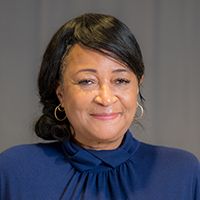 Roslyn Haley Faculty Accreditation Liaison, California Online Community CollegeCo-presenters: Roslyn Haley Faculty Accreditation Liaison, California Online Community CollegeCo-presenters:
|
The New Calbright College Board Policy Presentation The California Online Community College will be the 115th California community college in the system, offering a flexible and affordable education option for working adults. Enrollment will begin in fall 2019 and Board Policy is currently under review. The California Online Community College Board of Trustees directs that the review of Board Policy shall involve a means devised to include and receive important and relevant input from all constituents. Total input is valuable to the governing board to inform decision making, revisions, and approvals. This session will review all Board Policies in Chapters 3-5 that are under review and will present opportunities to participants to ask questions, provide input, and make recommendations. |
 Anya Zinoveva Art Instructor, El Camino College Anya Zinoveva Art Instructor, El Camino College |
Video Quizzes and Surveys as Equity Tools Equity can be indeed achieved through adaptive learning, as each student is unique and learns differently. The presentation will discuss the use of video quizzes and surveys to create a positive learning environment that promotes equity, to increase student engagement and retention, and to design continuous improvement of the course. Interactive videos as a formative assessment tool allow students to adjust the learning speed to their needs. In conjunction with the mastery path, they can be used to create an adaptive learning model to increase the success rate. The presentation will show how to create video quizzes, integrate them with Canvas grade book and provide an overview of the interactive video tools available in CCCD Canvas and beyond. Surveys can be used by the instructor to test and improve the efficiency of the teaching methods, provide timely help and increase the retention. The presentation will cover the use of surveys for monitoring student performance, tracking the students who are at risk of falling behind, and collecting ideas for course enhancement. Session Presentation/Resources: http://bit.ly/az-pdf |
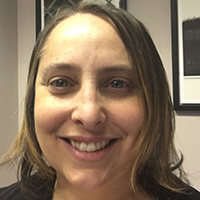 Julie Gamberg Distance Education, Faculty Development Coordinator Glendale Community College Julie Gamberg Distance Education, Faculty Development Coordinator Glendale Community College
Co-presenter:
|
You re DE Certified! Now What? Cultivating Confidence New DE Faculty can build confidence through cultivating institutional connection, community, hands-on support, as well as streamlined asynchronous learning tools. Shared results of our beta-tested institutional support will showcase two seemingly divergent approaches [will be shared]: (1) High-touch, highly personalized help in the form of an Online Learning Sherpa – a personalized instructional coach, and (2) fully asynchronous, streamlined supportive remediation in online instruction in the form 3-2-1 Go!, a countdown series for faculty planning a new course. Strategies, examples and satisfaction survey results of both approaches will be shared. |
